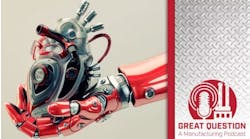Panasonic's Gustavo Sepulveda
Many companies are looking to bring manufacturing back to North America in order to diversify risk and be closer to their customers. While this has been a trend for some time, the recent set of worldwide conditions have elevated this need by demonstrating the risks associated with having manufacturing facilities so far from customers. To shorten the supply chain, companies will need technology to ensure stable factory operations, including components around employee safety, productivity and end-quality of its products.
Automation solutions can help do just that. Using the latest technologies such as MES (Manufacturing Execution System) software matched with strong IoT and next-generation 5G connectivity, automation implements more throughput and safer processes on the factory floor. In some instances, this may require specialized machines or robots, but in other situations this means the implementation of various software solutions to warrant a smoother manufacturing flow on the shop floor.
As automation helps companies be more efficient, safer and produce higher quality goods, these companies will eventually be able to grow and generate new jobs.
Today’s conditions have accelerated companies wanting to get closer to their markets and to diversify their supply chains. While reshoring will eventually rely on long-term infrastructure upgrades, such as the need for new railways, ports and roads, companies can implement short-term technological investments to enhance and reroute their supply chains. Automating part or all of the supply chain has a number of potential benefits for businesses, but enhancing efficiency across the board is the key outcome.
According to a recent Geodis survey, 70% of companies described their supply chains as very or extremely complex and had interest in incorporating automation and data analytics to enhance their supply chain operations.
Reshoring even a few specific elements of a company’s manufacturing process can remove a lot of the uncertainty that comes with global supply chains, especially during a pandemic. Reducing possible delays and ensuring safety amid potential global disruption (such as future waves of the pandemic or heightened instability with global trade conditions) will be a difficult task to plan for.
However, with the right solutions in place, companies can take preventative measures to ensure resilient factory and supply chain operations.
Automation tools, such as MES software, allow companies to analyze and track the efficiency of every step within the manufacturing process. From the amount of staff needed onsite, to the amount of raw materials on hand to maximize throughput, automation software will optimize available warehouse space and predict any errors along the way. Predictive-intelligence tools like this are crucial to the success of shortening supply chains as they will outline any holes within a company’s current warehouse operations and prevent them in future moves.
Deploying advanced automation tools such as MES, matched with strong connectivity solutions such as IoT and 5G, will enable the implementation of Industry 4.0 for optimized manufacturing facilities, no matter the location.
According to a recent McKinsey survey, most 5G IoT unit sales stem from manufacturing. Not only does MES ensure proper allocation of resources in order to reshore, it also drives business processes for multi-site manufacturers by standardizing workflows and procedures across locations. Given that it may not be realistic to transfer the entirety of a business’ manufacturing operations to a new location at once, deploying smart solutions will help enable a successful transition with automated tools, whether software or hardware, working in tandem with strong connected solutions to enable the transition from offshore manufacturing to manufacturing in locations closest to the end-user.
While automation and robotics are expected to realign labor resources, the World Economic Forum also expects 97 million jobs to be created in the coming years. This means that as manufacturers deploy automation technology to aid regionalized strategies with manufacturing hubs local to end-users, companies may also need to reskill their labor force.
Reskilling should be a priority as companies move skilled labor into higher value roles. To support this transition, companies can utilize automation capabilities brought on to assist reshoring efforts to also keep manufacturers from falling behind competitively, while reskilling its workforce.
To succeed in this current, unpredictable world, manufacturers have to adapt their supply chains with investments in both their technology and workforce. Updating technology to upskill the workforce will be critical to any company’s success in the current landscape. Furthermore, deploying automation tools to enable manufacturing plants and global supply chains to move across the world to accommodate the political and global health situation will be critical to many, if not all, business use cases in the near future.
Gustavo Sepulveda is the process automation business head with Panasonic




